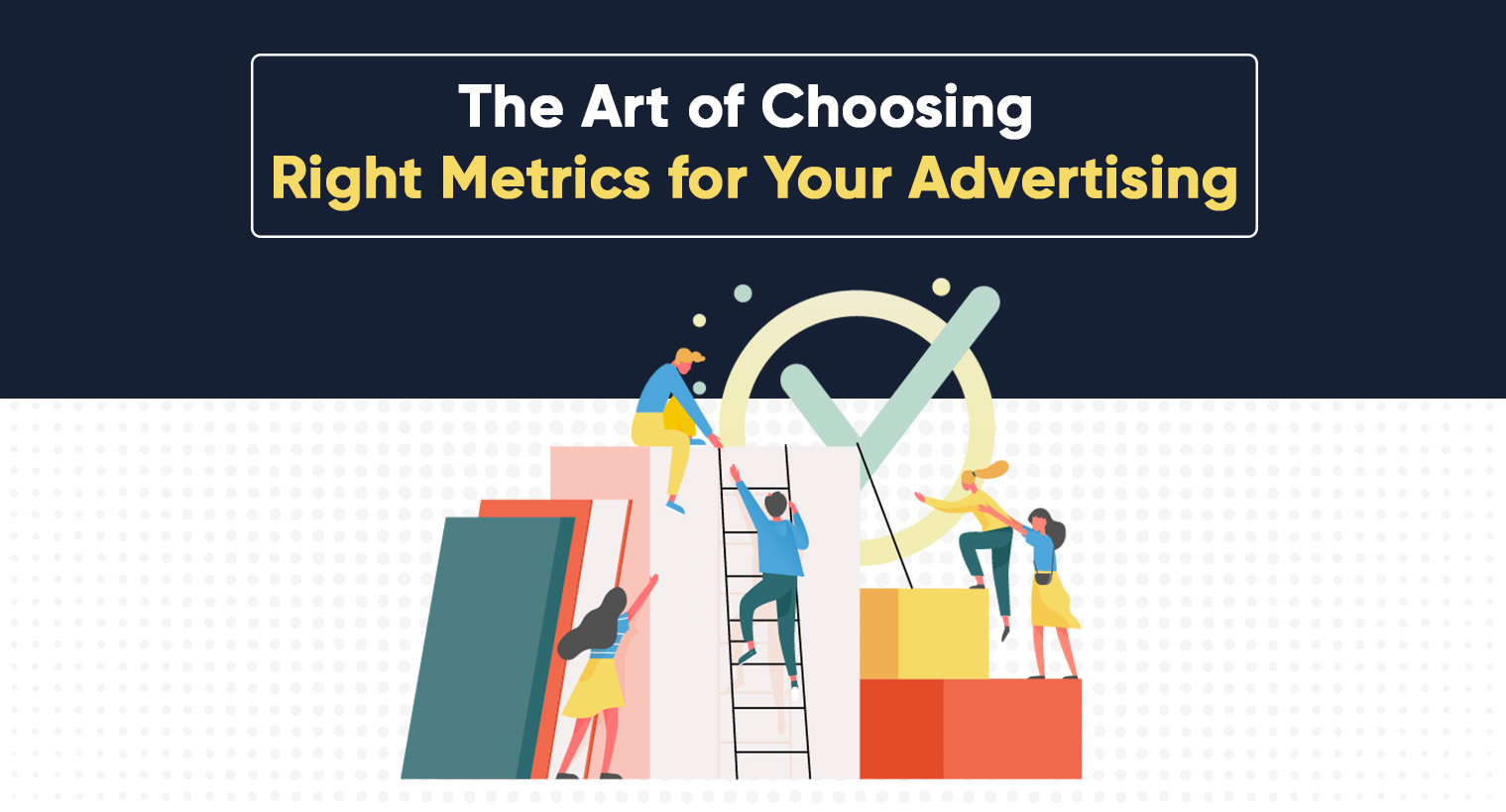The Art of Choosing Right Metrics for your Advertising Goal | 27 May, 2022

Advertisers are artists
Brainstorming outstanding solutions for driving ROI, creating eye-catching graphics, and developing the perfect CTAs.
But in today’s competitive landscape, advertisers must be more than just artists.
Why?
Digital advertising has forever altered the discipline by making the data more accessible than ever. And with the availability of data, comes the necessity for proof that our artistic efforts are offering business value.
But, what are the right metrics, techniques, and tools to track advertising campaign success?
Determining The Right Metric for Advertising
What’s the one metric that matters most for achieving triumph for your campaign and that you can hustle your team around? For WhatsApp, it is the number of sends; for Facebook, it is the active users; for eBay, it is the gross merchandise; for PayPal, it is the total payment amount. Once you’ve identified this “top” metric, you can set a goal around it, analyze it, understand what drives conversion in it, push it in the right way—and properly monitor and manage the health of your campaign.
Also Read: Top 10 Skills Digital Marketers Should Have
Top 10 Tips on How to Measure Advertising Campaign Success
To know more about the metrics, best practices, and tools required to measure and evaluate the campaign’s effectiveness, focus on the below-mentioned tips and tricks shared by the experts in the sales and marketing space to weigh in and share their input.
Begin with a clear objective and goal:
The initial step in measuring advertising effectiveness is to set the right goals, either for an individual campaign or an overall goal.
Determine what metrics you want to use:
Once you are clear with your goals and objectives, you should decide what are the key performance indicators you’ll be needing in order to analyze your advertising campaign effectiveness. Without the KPIs, you’d have no understanding of your success rate, and it may result in losing focus on what matters the most to your business.
Define a timeframe:
Time frames keep you aligned and create accountability. They offer a sense of urgency and make you take the necessary decisions to reach your desired goals and objectives.
Finalize a schedule to notice campaign results:
Once you’ve set your timeframe, you can begin assigning checkpoints to check your progress along the way.
Pick marketing tools to back your goals:
To measure your campaign’s effectiveness, you’ll need to put resources into a solution that can help you monitor and analyze your campaigns. There are a lot of tools like Facebook ad manager and Google Analytics that can help you track your ad campaigns and better understand your customers.
Use an advertising dashboard to present your results:
To make use of your data and to get actionable insights, you will need to use a marketing dashboard. With a dashboard, you can easily gather vital information about your ad campaigns and share insights with your firm executives and/or clients.
Monitor your performance:
Framing your marketing performance enables you to capitalize on development opportunities and look for areas for improvement. More significantly, you can get a competitive benefit and set more meaningful targets for your campaigns.
Send performance data to your CRM:
A CRM is an important tool for measuring advertising and marketing effectiveness. It can assist in organizing, connecting, and tracking all your data gathered along the path of a particular lead and/or customer.
Review your online feedback:
Daily checking feedback is important. You can understand the products and features that make your audience tick and optimize your ad campaigns to drive more profitable sales.
Don’t stop testing:
So, your ad campaign is finally running at a rapid pace!! and you might be feeling like the job is done. But, don’t forget, there’s always room for improvement, and regularly testing and adapting new techniques will lead to better performance.
The Importance of Measuring Marketing Effectiveness
First, define the term measuring advertising effectiveness for the purpose of clarity. Measuring advertising effectiveness is used by professionals to analyze and determine the efficiency and impact of advertising.
It’s both a valuable and an essential process
However, many advertisers are committing the mistake of using high vanity metrics across their campaigns to define marketing effectiveness. While vanity metrics provide some value, it’s next to impossible to define the success of your advertising campaign by just looking at metrics such as clicks, traffic, and conversions.
When you measure advertising effectiveness, you can notice what works and what doesn’t. You can also better evaluate the performance, track where your sales and leads are coming from, and look for areas of improvement.

BLOGS
Super Bowl Advertising: A Month-Long, Multi-Screen Event for Brands
For Americans, there are two events that they hyped for a whole year - Football season, and waiting for football season. Football remains highly popular among Americans, with searches for "NFL Draft" and viewership numbers showing an unwavering interest in the sport. According to Google Search data, football is more ...

BLOGS
Advertising in the Age of Climate Change: The Adoption of Carbon Emission Metrics
The urgency of the climate crisis is increasing, and the media industry is no exception. While some professionals are working to reduce their direct operational emissions, there is an urgent need for common standards to be set for indirect emissions that come from digital advertising. The digital advertising industry is becoming ...

BLOGS
Complete Guide to Reaching Audience with Cookieless Advertising
What’s your alternative game plan for effective cookieless advertising? Haven't thought about it yet? The time is now! Introduction The complete year of 2022 was dedicated to cookies! Panic is setting in amongst marketers owing to mounting privacy laws and the ban on cookies, causing them to re-evaluate their strategies.







